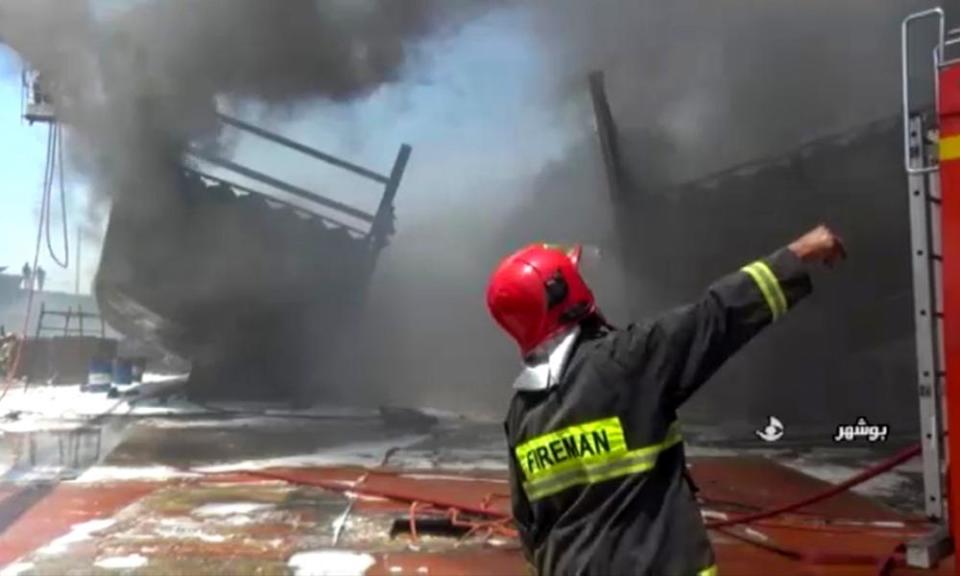Seven vessels catch fire in southern Iranian shipyard

At least seven vessels have caught fire in a southern Iranian shipyard, in the latest in a series of explosions and fires that analysts speculate could be part of a state-sponsored sabotage campaign targeting the country’s industrial, nuclear and military sites.
No casualties were reported at the port of Bushehr, the city that hosts Iran’s only nuclear power plant, but images distributed by state media showed plumes of thick smoke billowing into the air and several fire trucks at the site.
“Right now, fire in the vessel-making factory of Tangak, all sectors have come in – army, fire fighters, airport,” an unnamed source said in a video from the shipyard posted on social media.
Another showed dark fumes over the surrounding area:
يحدث بمدينة بوشهر الآن . pic.twitter.com/hwh3LQtoAJ
— M.Majed محمد مجيد (@MohamadAhwaze) July 15, 2020
Jahangir Dehghani, the head of the provincial emergency department, said the fire broke out about 1pm and was still raging seven hours later. The cause of the fire was unclear and would be investigated after it was extinguished, he told the state-linked Tasnim news agency.
Wednesday’s blaze is one of a spate of incidents across the Iran in recent months including at sensitive sites that have raised suspicions the country is being subjected to a covert US or Israeli military campaign.
In the past three weeks alone there has been an explosion at a centrifuge assembly facility at the Natanz nuclear site, another at a suspected missile production facility east of Tehran, reports of blasts in two towns including one that hosts military garrisons, a fire at a petrochemical facility, a deadly fire at a medical laboratory in the capital and several more blazes including at a petrochemical facility on Sunday.
The Natanz blast in particular appeared to be a hostile act, targeting a facility believed to be producing advanced centrifuges capable of more quickly enriching uranium to weapons-grade levels. Iranian officials initially described the site as an “industrial shed” but later admitted the incident had caused major damage and set back its centrifuge development for the “medium term”.
Israeli and US officials have declined to comment in detail, but some have offered cryptic denials that have fuelled rumours of their involvement in at least some of the incidents. Several, such as a gas explosion at a residential building in Tehran four days ago, are thought to be more likely the result of poor infrastructure, maintenance or training.
Even if most were accidents, analysts said it was clear Iran’s adversaries were trying to mount something more explicit and public than Israeli and US efforts to sabotage the Iranian nuclear program a decade ago, which involved cyber attacks and assassinations that attracted less immediate publicity.
“It tells us we’ve entered a new era in this kind of shadow war,” said Dina Esfandiary, a fellow at the Century Foundation thinktank. “One where the Israelis and the Americans don’t care about the casualties or consequences of these attacks becoming public and increasingly visible, and coming under international scrutiny for carrying them out.”
It was notable that Iran had resisted directly blaming Israel or the US, said Aniseh Bassiri Tabrizi, a research fellow at the Royal United Services Institute and an expert on the Iranian nuclear program. “If it points the finger it means there has to be a response,” she said.
She said Iranian leaders were understood to be waiting out Donald Trump’s presidency in the hope that he is defeated in November’s presidential elections, and then replaced by a Democratic administration more amenable to a diplomatic approach.
As a result, even provocative acts as the assassination of Revolutionary Guards general Qassem Suleimani, one of the country’s most popular officials, had drawn a response carefully calibrated aimed at avoiding escalation, she said. The sabotage incident could be an effort to goad Tehran into a confrontation before the political atmosphere shifted.
“Iran has a wait-it-out strategy, but there are those who are trying to curb Iran’s nuclear program by [non-diplomatic] means and maybe trigger a response from Iran that might create more chaos before the US election – which I think Iran is taking into account,” Bassiri said.
Amos Yadlin, Israel’s former military intelligence chief, told the Guardian the possible suspects included the US, as part of its maximum-pressure campaign to force Iran to renegotiate the nuclear deal, as well Israel, internal Iranian dissidents, or Saudi Arabia, which blames the Islamic Republic for a drone attack on its oil processing facilities last October.
Whoever the culprits, he agreed the timing of the incidents was likely linked to the US presidential polls. “I believe that it all has to do with the fact that there are elections in the US and these elections may change the policy of the US and some people may think this is the last time to react against Iran,” Yadlin said.

